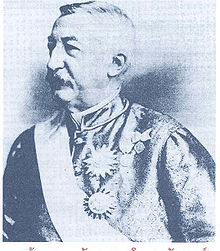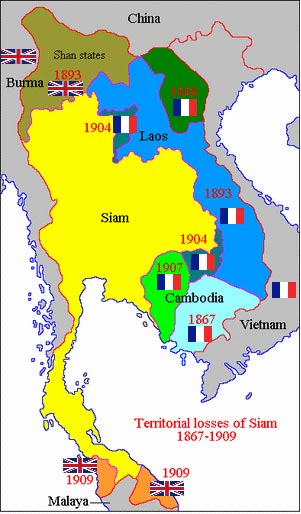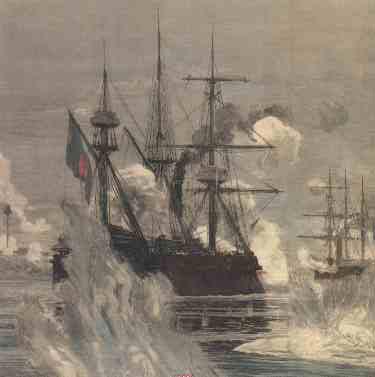Gustave Rolin-Jaequemyns, advisor to King Chulalongkorn from 1892 till 1901

Gustave Rolin-Jaequemyns in a traditional Thai garment.
There are some famous Western expatriates (early farangs) who played a role in Thai history, or otherwise made an impact. Best known and most written about likely is Constantine Phaulkon (1647-1688), of Greek origin, and a counsellor and politician at the court of King Narai, during the Ayutthaya period. Another famed person is Anna Leonowens, who taught the wives and children of King Mongkut (Rama IV), and later became a media personality and writer, whose books loosely provided the content for the movies 'The King and I'.
During the late 19th century, a Belgian expatriate, Gustave Rolin-Jaequemyns (1835-1902), played a important role as an advisor to King Chulalongkorn (Rama V).
Prior to his position as an advisor Gustave Rolin-Jaequemyns played an important role in legal matters, and later Belgian politics. He studied law at the University of Ghent (located in Flanders, but at the time the language used at all Belgian universities was French). After his studies, he devoted himself to international law. He helped establish the Institut de Droit International (Ghent, September 1873). This institute was the first permanent body of legal experts to focus on international law, and received the Nobel Peace Prize in 1904, two years after the death of Gustave Rolin-Jaequemyns. From the mid 1870s, Rolin occupied himself also with the situation in the Belgian Congo.
Gustave Rolin-Jaequemyns was also active in Belgian politics and member of the Unitarian Liberal Party. He became Minister of the Interior of Belgium from 1878 to 1884.
After losing his position as Minister, and also due to the loss of his family fortune (by his brother, due to poor investments), Gustave needed to earn a living.
During a stay in Egypt (where he was looking for a suitable position), he met Prince Damrong of Siam, a half-brother of King Chulalongkorn (Rama V). He was offered a position in Siam with a contract that specified two functions : to assist the Siamese government to modernize and codity the country's body of laws, and to act as an advisor in foreign affairs to the King of Thailand.
He arrived in Bangkok in September 1892, and stayed there till 1901 (one year before his death).

Historical reminder : How Siam (presently Thailand) became smaller, due to the colonial powers France and Britain.
At the time, the colonial powers Britain and France, were very active in South-East Asia. France had already taken possession of Vietnam and large parts of present day Cambodia and Laos (the two latter entities mostly 'part of Siam' and maybe better categorized as being in the sphere of influence of Siam, since border demarcations were uncommon at the time).
Britain was the colonial power in Burma (present-day Myanmar) and Malaysia. Some Malay southern provinces of Siam, were lost to the British.
Together with other foreign advisors, Gustave Rolin-Jaequemyns helped to reform the Thai legal system. In doing this, he did not simply transplant western values, but took traditional Thai law into account. He was also instrumental in the foundation of Siam's first law school. Nowadays his statue is standing on the campus of the Law Faculty of Thammasat University in Bangkok.

Artistic impression of the Pak Nam incident on the Chao Phraya River (1893)
In politics, a significant development took place in 1893, when three French warships forced their way up the Chao Phraya river. The Siamese fired on the vessels, and were responded upon by the French ships. Rolin-Jaequemyns played an important part in the negotiations, following the 'Pak Nam Incident'. He was able to negotiate with both the French and British colonial powers, helped by his experience and contacts with European society. The negotiations lasted for many years, and as stated Siam lost large parts of its prior territory, but the central core of Siam remained independent. Siam was never colonized.
For his achievements King Chulalongkorn Gustave Rolin-Jaequemyns received the rank of Chao phya, the highest non-royal rank in Siam. He also received the Thai name of Abhai Raja, given to him by King Chulalongkorn.
King Chulalongkorn is quoted as having said : "The competence and gesture of this person, who was so important to the government of Siam, will be imprinted in our memory forever".
There was a reason for writing this. First of all, being Belgian ourselves, we were not very well aware of the importance of Gustave Rolin-Jaequemyns in Thai history and politics. Possibly as a result of poor 'marketing'.
Secondly, a while ago, on 24 February 2011, Gustave Rolin-Jaequemyns, was voted as the Top Farang (foreigner in Thailand) at the Symposium 500 Years : Europeans in Siam, organized by National Museum Volunteers Bangkok at the National Theatre.
Images on this page courtesy of Wikipedia.org

